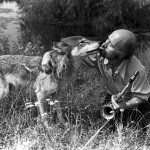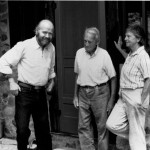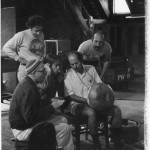Paul Winter founded Living Music in 1980 as the recording context for his ensemble, the Paul Winter Consort, and his community of colleagues, which includes some of the finest jazz, classical and world music musicians, along with notable voices from the great symphony of the wild.
Milestones leading up to the creation of his own Living Music record label include his college jazz sextet’s horizon-expanding tour through 23 Latin American countries; the group’s seven initial albums for Columbia Records under producer John Hammond; Paul’s sojourns in Brazil during the mid-1960s; and Paul’s meeting Pete Seeger in 1966, who encouraged him towards a more participatory kind of music.  Hearing the songs of the whales in 1968, and soon after, encountering the songs of the wolf, opened Paul’s ears to the greater symphony of nature and to a music that celebrates the creatures and cultures of the whole earth.
Hearing the songs of the whales in 1968, and soon after, encountering the songs of the wolf, opened Paul’s ears to the greater symphony of nature and to a music that celebrates the creatures and cultures of the whole earth.
Intrigued by the music he’d heard in Latin America, Paul began an odyssey exploring the world’s musical traditions, which continues today. After living in Brazil for a year in the mid-‘60s, he began envisioning an ensemble that could be a forum for the whole range of musical genres he’d come to love – from Bach to African music – and include as well notable voices from the symphony of nature (as the whale, wolf, and eagle). He organized a group for which borrowed the name “Consort” of Elizabethan times, from the house bands of Shakespearean Theatre, which also blended woodwinds, strings and percussion, and allowed the players to embellish on the written parts.
The group made three studio albums with producers Paul Stookey and Phil Ramone, and then the Icarus album, produced by George Martin, and recorded in the summer of 1971 in the unhurried, unpressured atmosphere of a rented house near the sea. That landmark experience underscored the importance of establishing a place where Paul could nourish his music and his community.
Annual visits to the exemplary Maine homestead of Helen and Scott Nearing inspired Paul to find a barn and some land of his own, in northwest Connecticut, where he could really live his music. The album Common Ground was recorded there during a summer-long outdoor music “village,” interweaving elements from different music traditions with the voices of whale, wolf, and eagle.
The momentum that finally launched Paul’s Living Music label came from several directions: the burgeoning wish-list of albums the Consort dreamed of creating; the encouraging growth of an audience that not only listened, but cared about the Earth; and the accumulated frustration of experiences with large record companies. Another great impetus was the invitation to be artist-in-residence at New York’s Cathedral of St. John the Divine. This gothic cathedral, the world’s largest, has extraordinary acoustics, and Paul was thrilled with the prospect of recording future albums there.
Callings was the Living Music label’s first production: a celebration of the voices of the sea, in a double-album with 24-page color booklet featuring photos of the sea mammals. No record company in the world would have funded such a maverick album, but fortunately, over the years, Paul’s music had made many friends. With the help of some of them, and a few environmental groups, Callings was produced, and Living Music was born.
Paul chose the Living Music name since it alluded to his primary intentions: to strive toward timeless music; to record in natural acoustic spaces, like stone churches, canyons, or the loft of a barn; to create a catalogue of music that would embrace the vital traditions of music he revered, from Bach to Africa, and cello to wolf.
Paul knew there would continue to be confusion in the realms of marketing as to how to categorize the music. Since early days, the various attempts to label his music have been an ongoing source of amusement to the Consort: “acoustic fusion,” “classical folk,” “camber jazz,” “progressive music,” “good music,” “freebus musicus,” “ecological jazz” (in Russia), “La Fusion Animal,” (in Spain), and “earth jazz,” (in Japan).
Musicians such as David Darling, Paul McCandless, Ralph Towner, Glen Moore, Collin Wolcott, Nancy Rumbel, Jim Scott, Rhonda Larson, Russ Landau, Glen Velez, Paul Halley, Eugene Friesen, Susan Osborn, Arto Tuncboyaciyan, Paul Sullivan, Mickey Hart, Oscar Castro-Neves, Nóirín Ní Riain, Jordan Rudess, Davy Spillane and many others have performed in or with the Consort, and can also be heard on Living Music albums. Living Music has released over 40 titles of Earth Music, 12 have been nominated for a Grammy® Award, and 7 have won.



Follow Paul on